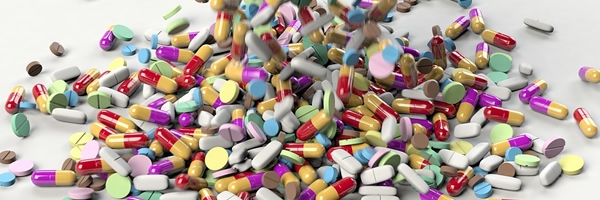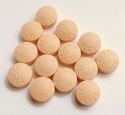PEG stands for polyethylene glycol and is a compound you can find lurking in more places than you might think. But just how safe is polyethylene glycol?
Pharmaceutical and Over-the-Counter Drugs
OverTheCounterDrugs.jpg

Photo by qimono / pixabay.com
In the War Against Opioids, We Need Alternatives
Painkillers like ibuprofen, acetaminophen, and in increasing numbers, opioids, have become our go-to solutions for pain management with significant costs – addiction, abuse, overdose, and death – and without the promised benefits. Thankfully, there are many alternatives to prescription painkillers, many of which are much safer and gentler on your body.
Introducing “Gastropause”
We have all heard of “menopause” in women and “andropause” in men. “Gastropause” occurs as we age when the stomach secretes suboptimal hydrochloric acid. The acid-suppression theory, which currently governs the conventional medical therapy of “acid indigestion,” is seriously flawed. Regrettably, many of the potential consequences of long-term acid suppression, including asthma, allergies, skin disorders, rheumatoid arthritis, insomnia, osteoporosis, gastrointestinal (GI) infection, depression, and many, many more can take years or even decades to develop. If you take Tagamet® (cimetidine), Zantac® (ranitidine), Pepcid® (famotidine), Axid® (nitazidine), Prilosec® (omeprazole), Prevacid® (lansoprazole), Aciphex® (rabeprazole), or Nexium® (esomeprazole) this is a must read.
Doctors Reverse Decades Old Aspirin Recommendation
New cardiovascular disease prevention guidelines submitted jointly by the American College of Cardiology and the American Heart Associated and published in the Journal of the American College of Cardiology contradict decades of routine medical advice by explicitly advising against the daily use of low-dose or baby aspirin (75-100 mg) as a preventive health strategy against stroke or heart attack, in most cases.
The Stevia Myth
Stevia and other non-caloric sweeteners promote weight gain, GI disorders, and diabetes to a greater extent than sugar does. Learn about the myths and the facts surrounding stevia.
The Perils of Polypharmacy
Polypharmacy is a serious and increasingly common problem that makes patients sitting ducks for adverse side effects and dangerous drug interactions, raises risk of hospitalization and death, and drives up health care costs.
Don't Believe the Hype About Statin Drugs
Many doctors believe statin drugs are helpful for “secondary prevention” for patients with serious cardiovascular disease who have already suffered a heart attack or stroke. In this high-risk group, the “number needed to treat” (NNT) for statin drugs to save one life over five years is 83. Considering the toxicity of these drugs, clearly more people will be harmed than helped.
Do Fats and Cholesterol Really Cause Heart Disease, or Have We Got It Wrong?
The truth is that we humans cannot live without cholesterol and animal fats! Our bodies are made out of cholesterol and fats to quite a large degree! Every cell in our bodies produces cholesterol and fats all the time during all of our lives.
Avoid the Metformin Bandwagon
What are the preferred natural alternatives to metformin? The botanical berberine stands out as the obvious number one alternative. Berberine is safer and equal to or superior to metformin. For example, for treatment of type-2 diabetes, insulin resistance and the high lipid levels resulting from insulin resistance, berberine is equal (in blood sugar and insulin resistance regulating effect) or superior (in lowering high lipids) to metformin. For heart disease Berberine has not been reported to cause low blood sugar, vitamin B12 or folate deficiency, raise homocysteine levels, or increase the risk of heart attacks.
Beware of NSAIDs, Especially After a Heart Attack
NSAIDs (non-steroidal anti-inflammatories) have the potential to affect the kidneys and liver, contribute to high blood pressure in women, and cause intestinal bleeding. Some research suggests that NSAIDs are cardio-toxic. Stephen Sinatra, M.D., warns patients not to take them on a regular basis for any length of time.
Why Women Should Stop Their Cholesterol Lowering Medication
Dr. Mark Hyman discusses a study in the Archives of Internal Medicine that found statins increase the risk of getting diabetes by 71 percent in post-menopausal women. Since diabetes is a major cause of heart disease, this study calls into question current recommendations and guidelines for women to take statins to prevent heart attacks (called primary prevention) and suggests they may do more harm than good.
The Bad News Continues for HRT
Considering how much news comes out on the consequences of taking conventional HRT, I think it is important to stay abreast of the latest research on the subject. It's so compelling that I wanted to share some important new findings from this past year alone.
Cardiovascular Health and CRP: Statins Are Not the Answer
Julian Whitaker, M.D., stresses the therapeutic powers of diet, nutrition, exercise, and all-natural hormonal and dietary supplements in a balanced approach to health and wellness. He addresses heart disease, cholesterol and the common blood test for inflammation, C-Reactive Protein and the use of statin drugs. Are they friend or foe?














